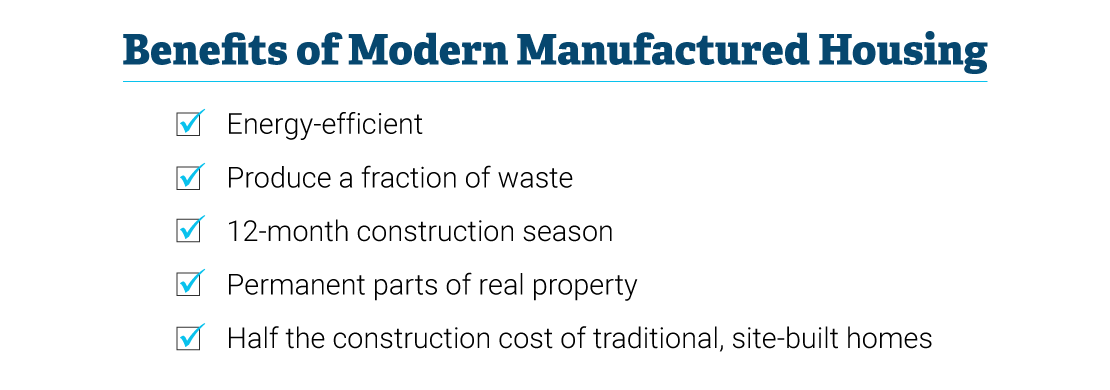Next-Gen Manufactured Housing Requires a New Appraisal Approach

Freddie Mac
It’s no secret to anyone working within the housing ecosystem that there is an ongoing affordability crisis in America. According to the National Association of Home Builders, 75.1 million households, or roughly 60% of all U.S households, are currently unable to afford a new median priced home.
A convergence of factors, exacerbated by the effects of the COVID-19 pandemic, continues to depress housing starts and drive prices higher, pushing many would-be homeowners out of the market.
However, manufactured housing—no longer the stuff of rural stereotypes and stigma—is a highly evolved lower-cost approach to producing high-quality homes that are attractive, well-appointed, energy-efficient and built to last.
Manufactured housing offers opportunities to many aspiring U.S. homebuyers locked out of the market by inflated pricing, and appraisers may very well hold an important key.
An Affordable Alternative
With half the construction cost of traditional site-built homes, a fraction of the waste production, and a 12-month construction season, the upside of a manufactured home is significant. Unlike yesterday’s “mobile homes,” today’s manufactured homes, including the new CrossMod™ category, are permanent parts of the real property on which they’re sited and are often indistinguishable from traditional site-built homes.
The evolution of manufactured housing and ways to finance it is a promising development for many lenders who can leverage new, innovative and affordable mortgage initiatives. Such solutions can help address the affordability crisis and extend homeownership opportunities to more households. Currently, 22 million live in the nation’s 8.5 million people factory-built homes—10% of America’s housing stock.
While currently beset by the same pandemic-induced shortages of lumber, fixtures and other materials conventional builders face, the manufactured housing industry expects substantial growth as the supply chain returns to normal.
 Appraisers Have a Vital Role to Play
Appraisers Have a Vital Role to Play
The extent to which manufactured housing can or will make an appreciable dent in the affordability crisis depends in significant part on awareness and adoption by the real estate and mortgage industries. In order for buyers to consider manufactured housing as a viable option, real estate professionals must knowledgeably present these properties and articulate their advantages. Purchasing a home, regardless of its construction, most often requires financing. Lenders and appraisers need to understand the advantages and nuances of manufactured housing to arrive at an accurate valuation of the property that will be financed with a mortgage.
Appraising modern manufactured homes is not without its challenges. For example:
- Some communities may lack comparable properties because of manufactured homes that are not titled as real property or lack the modern amenities, energy efficiency and stronger, more durable construction technology of today.
- Appraisers in urban or suburban markets may be unfamiliar with manufactured homes, which are found mostly in rural areas.
- The markets some appraisers serve may have limited comparable properties with recent sales histories on which to base their valuations.
“I speak with appraisers across the country on a regular basis,” said Scott Reuter, chief appraiser for Freddie Mac’s Single-Family Division. “I tell them the industry is changing, and the best thing you can do to keep pace with that change is to raise your proficiency with the developing technology, not just in terms of software, but new construction technology as well. This includes getting smart about manufactured housing, because it’s what’s next.”
Getting Appraisers Up to Speed
Education across the housing ecosystem is obviously crucial, particularly in the appraisal space. Recognizing this need, the Appraisal Institute® offers classes specifically focused on manufactured homes titled as real property, including the CrossMod™ homes eligible for CHOICEHome® mortgage financing.
Developed in conjunction with Freddie Mac, the comprehensive training teaches appraisers the ins and outs of manufactured home valuation, including:
- Sales comparison.
- Data collection.
- The application of HUD codes to permanently sited factory-built housing.
The classes are available virtually, as well as in-person, sponsored by national and local Appraisal Institute chapters.
As more people recognize the advantages manufactured housing provides to buyers contending with affordability challenges, the appraisal community is uniquely positioned to be a catalyst for its expansion and broader acceptance. Their leadership can help overcome impediments to growth for this promising housing sector, and in so doing create more opportunities for both the lenders they serve and many more families aspiring to homeownership.
Subscription Center
Get and stay connected with Freddie Mac Single-Family. Subscribe to our emails and we'll send the information that you want straight to your email inbox.